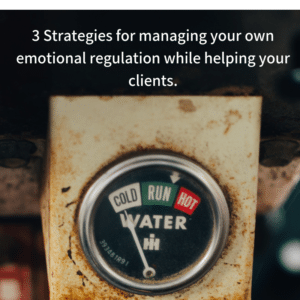One of the cornerstones of treating trauma is helping clients establish good emotional regulation. It is vital for a therapist who is treating trauma to be aware of their own emotional regulation. The therapist not only models good skills but also create a sense of safety for the client by having good emotional regulation.
Window of Tolerance
You cannot talk about emotional regulation without talking about a term Dr. Daniel Seigel coined, Window of Tolerance.
The window of tolerance is used to describe the capacity of a person to handle the stressors of life. I describe the concept as the times a person feels relaxed and calm but also alert and ready at the same time.
Emotional regulation is a term used to describe a person’s ability to effectively maintain within their window of tolerance. A person uses a number of healthy and unhealthy skills to manage their responses to emotional experiences throughout the day. Many of the skills used are unconscious.
Constantly Adjusting
When I am working with a trauma survivor I am constantly checking in with myself to notice how I feel and adjust accordingly. I work to stay aware of my window of tolerance. Sometimes I use my emotions as indicators of the client’s feelings. Other times, I notice my own emotional response to hard content that the client is processing through. Either way, I work to remain in my window of tolerance.
Below are some strategies you can use to help you maintain your emotional regulation while working with clients.
3 Tips to Help with Emotional Regulation
- Notice Your Body: Being aware of your body can give you helpful cues on where you are in your window of tolerance. For example, if I feel myself bracing or carrying tension in my core that is a clear sign that I am getting over activated. I will ground to help that tension pattern release or I might take a couple of deep breaths.
- Take Breaks: I have learned that it is good to take breaks in session when needed. You could take a traditional break where you and the client get up and stretch, one or both of you take a restroom break or someone gets a drink of water. It could be more of a non-traditional break where you divert the conversation to something more surface level or pleasant in nature. I call this a break from the heavy content in session.
- Set your Environment Up for Success: I think it is important to decorate your office in a way that is pleasant to you. I also think having a comfortable therapist chair is important. Having a space that is supportive of you is and you enjoy is helpful in maintaining emotional regulation.
In Conclusion
Most survivors of trauma who come see you will need help identifying and maintaining emotional regulation. Having ways to track and regulate your own emotions will be helpful to your client and yourself while working with trauma. Don’t delay identify some emotional regulation tools you can use for yourself today.
Comment Below:
What are you cues that you are outside of your window of tolerance?


One Response
Thanks for your comments. Also feel free to join my email list so that you are notified each week when a new blog post comes out. You can find the link to do that on my homepage near the bottom.